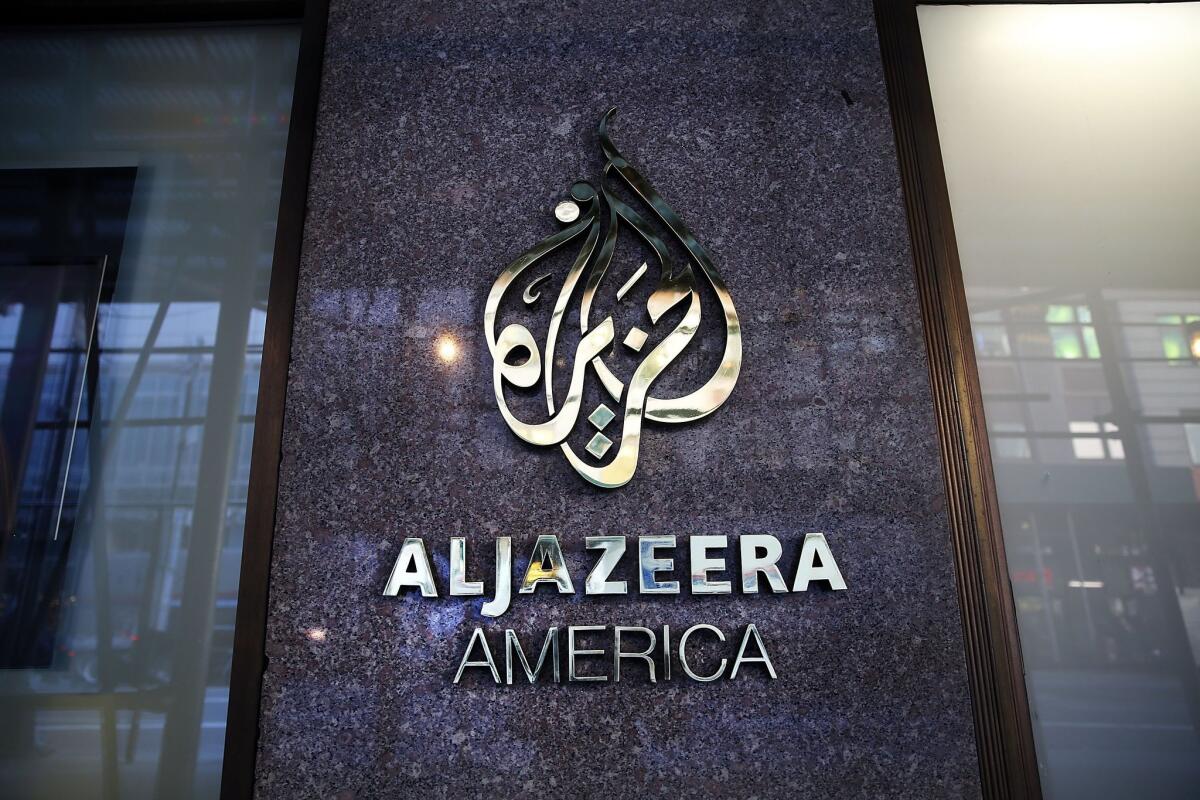Al Jazeera America will shut down its cable TV network in April

The logo for Al Jazeera America is displayed outside of the cable news channel’s offices on Jan. 13 in New York City. The company, which debuted in August 2013, announced it is shutting down.
- Share via
Al Jazeera’s is giving up on its attempt to crack the U.S. TV news market, less than three years after its much-publicized debut in America.
The Qatar-based company announced Wednesday that it will shut down cable channel Al Jazeera America and its digital operations in April, squeezed by declining oil prices, a fiercely competitive TV landscape and a brand that American viewers never embraced.
The entity’s chief executive, Al Anstey, said the decision “is driven by the fact that our business model is simply not sustainable in light of the economic challenges in the U.S. media marketplace.”
Al Jazeera America was a play by Al Jazeera Media Co. to expand into the U.S. with a service seen as an alternative to CNN, Fox News and MSNBC. The parent company, which is owned by the government of Qatar, purchased the cable outlet Current from former Vice President Al Gore and his partners for $500 million in 2013 and replaced it with Al Jazeera America in August of that year.
Al Jazeera hired on-air talent familiar to U.S. news viewers, including former NBC News weekend anchor John Seigenthaler and Joie Chen, a veteran of CBS News and CNN. Its producers and executives also came from established networks.
The channel also sought to distinguish itself by emphasizing a more serious approach to its journalism and did not depend on the confrontational talking heads that are a staple of American cable news. It won a Alfred I. du Pont Award from Columbia University in December for “Hard-Earned” a six-part documentary series on the economic struggles of middle-class families in the U.S.
But the network perhaps drew its greatest attention for airing a recent documentary that reported that Denver Broncos star quarterback Peyton Manning had acquired human growth hormone during his lengthy recovery from neck surgery. (Manning, who denied the report, mocked the network’s demise to sportswriters on Wednesday, saying “I’m sure that will be devastating to their viewers.”)
Despite Al Jazeera America’s intentions, however, the network struggled to connect with U.S. viewers, in part because of its polarizing name and logo, which is spelled out in Arabic. While Al Jazeera’s journalism is highly respected overseas, some U.S. viewers probably associated the moniker with its dissemination of Osama bin Laden videos after the Sept. 11, 2001, terrorist attacks, analysts said.
“I think they badly misread the American market,” said Betsy West, Fred W. Friendly professor of professional practice of media and society at the Columbia University School of Journalism. “They misread the toxicity of the Al Jazeera name and that affected cable carriage. You couldn’t see Al Jazeera because cable companies didn’t pick them up.”
Al Jazeera America is available in 60 million cable and satellite homes. Fully distributed networks typically reach 90 million homes or more.
The channel’s ratings suffered as a result. Among viewers age 25 to 54, the group advertisers seek to reach with news programming, Al Jazeera America averaged 7,000 viewers in prime time during 2015 compared with 244,000 for CNN.
West said the failure of Al Jazeera America should not be seen as viewers rejecting a high-minded approach to TV news.
“People will come to watch good stuff,” she said. “But they have to be able to find it.”
West added that “the business model was the largesse of the government of Qatar, and when oil prices fell, they had no backup plan.”
Al Jazeera will remain a presence in the U.S. market by making available the digital content it offers to worldwide audiences.
“This expansion will allow U.S. and non-U.S. consumers alike to access the network’s journalism and content wherever and whenever they want,” the Al Jazeera Media Network said in a statement. “By expanding its digital content and distribution services to now include the U.S., the network will be better positioned to innovate and compete in an overwhelmingly digital world to serve today’s 24-hour digitally focused audience.”
stephen.battaglio@latimes.com
More to Read
Sign up for The Envelope
Get exclusive awards season news, in-depth interviews and columnist Glenn Whipp’s must-read analysis straight to your inbox.
You may occasionally receive promotional content from the Los Angeles Times.







